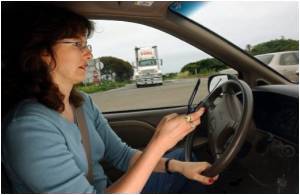
Twenty-seven percent of the adults said they have sent or read a text message while driving compared with 26 percent of teenagers.
"This data suggests that adults are now just as likely to engage in this risky behavior," said Mary Madden, co-author of the report. "Adults may be the ones sounding the alarm on the dangers of distracted driving, but they don't always set the best example themselves."
Sixty-one percent of adults said they have talked on the telephone while driving compared with 43 percent of teenagers.
Forty-nine percent of the adults said they have been passengers in a car where the driver was sending or reading text messages.
"It is just as hard for adults as it is for teenagers to resist chatting with friends and sending off that quick text even in the midst of heavy traffic," said Lee Rainie, director of the Pew Internet & American Life Project and a co-author of the report.
Advertisement
Outside of the car, 14 of the adults say they have physically bumped into another person or an object because they were distracted by talking or texting on their phone.
Advertisement
Source-AFP









